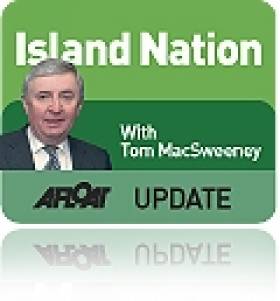Displaying items by tag: POGO
Living Beyond Our Means
That is not a title referring to the current economic situation, though it is certainly apt in that regard. I am using it to refer to the fact that as humans we live on relatively small pockets of land on this planet that is dominated by the oceans upon which we depend for life. So much damage is being done to those oceans that 600 marine scientists this week issued a sombre warning:
"It is well past the time to get serious about measuring what is happening to the seas around us."
I was looking this week at an interesting sight, an image of the Earth taken from outer space in which our planet appears as a globe, dominated by a huge drape of blue hues broken up by irregular patches of brown and green, with swirls of grey and white above them. The blue are the oceans, the patches of brown and green the land and the swirls of grey and white the clouds. It made me think that, if life had evolved on another planet and scientists from there were looking at Earth, they would see it as a water planet, dominated by the oceans which cover over 70 per cent of its outer surface.
The oceans are what set Earth apart from other planets in the solar system. They contain over 324,126 cubic miles of water, an enormous quantity of liquid upon which life on the planet depends. We humans, who lack the ability to live totally in water, who do not possess the gills with which marine life is equipped, who are land-bound, air-breathing organisms, have forgotten how unrepresentative is our perspective of land in relation to the oceans. They occupy two-thirds of the world on which we humans live and which we believe was made for us. Yet, there is much more life in the seas. Isn't that an interesting thought, particularly as human life continues to abuse the oceans?
POGO is an organisation linking 80 per cent of the world's institutions studying the oceans. The "Partnership for Observation of the Global Oceans" was created by leaders of the world's major oceanographic institutions. One of its major aims is to reach out to the public, creating more awareness of the seas. It has now established 'Oceans United,' an international forum intended to become 'The Voice of the Oceans,' sharing observations, knowledge and information for the benefit of humanity which depends for its continued existence on the survival of the oceans.
The 600 marine scientists who issued that sombre warning are members of 'Oceans United.' They have called for an integrated global ocean observation system which would monitor the entire ocean surface:
"The situation is that serious. Every country in the world needs to unite, irrespective of their differences, because the ocean surface is now more acidic than ever before and this will affect life on our planet."
The danger from this rising trend is that it will affect the basis of life in the sea – the plankton which are at the base of the global marine food chain. This is not a remote, ethereal issue. Scientists are concerned that the origins of recent world catastrophes such as the floods in Pakistan and summer heat waves and forest fires could be traceable to effects on the oceans as they grow saltier, hotter, more acidic and thus less biologically diverse.
• This article is reprinted by permission of the EVENING ECHO newspaper, Cork , where Tom MacSweeney writes maritime columns twice weekly. Evening Echo website: www.eecho.ie






























































